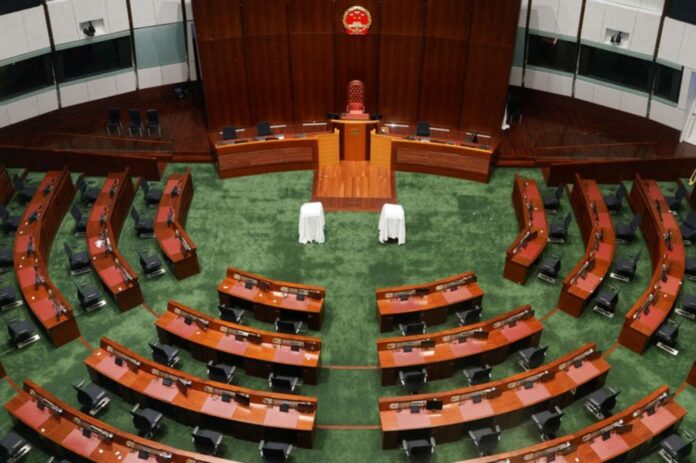The Chinese national emblem is seen on the wall as it replaces the Hong Kong emblem at the Legislative chamber, before the Legislative Council election in Hong Kong, China, December 17, 2021. — Reuters pic
HONG KONG, Dec 19 — China says Hong Kong’s new ‘patriots only’ legislature will put the city back on track and free it from a disruptive opposition. Critics say pro-democracy voices have been banished and a rubber stamp law-making body created.
So how will this new system work?
LegCo
Hong Kong is run under a “One Country, Two Systems” model where Beijing promised the city could maintain certain liberties and autonomy for 50 years after the 1997 handover by Britain.
The city is led by a chief executive who is appointed by a small pro-Beijing committee. New laws are debated and passed by the Legislative Council, known locally as LegCo.
Unlike China’s rubber stamp legislatures, Hong Kong’s law-making chamber was an often raucous place.
While pro-establishment figures were guaranteed a majority, a small minority of mostly democratically-elected opposition lawmakers was permitted and thrived.
They often challenged and held up controversial legislation, creating a rambunctious, outspoken political scene that would have been unthinkable on the Communist Party-controlled Chinese mainland.
Under the new rules, this has changed.
‘Patriots only’ reforms
After huge and often violent democracy protests swept the city two years ago, China imposed a new political blueprint for Hong Kong.
LegCo was expanded from 70 to 90 seats but the rules drastically curtail who can run for office and the number of directly elected seats.
Only those deemed patriotic and politically loyal can stand for office.
Most prominent pro-democracy activists are either in jail, have fled overseas, or barred from standing. Mainstream opposition democracy parties have decided not to even try and compete.
Election Committee
The biggest chunk of LegCo seats, 40, will be picked by a select “Election Committee” of 1,500 staunch Beijing loyalists.
The same committee, which makes up 0.02 per cent of the city’s population, will appoint the next chief executive in 2022.
It is made up of political and business elites, including some of the city’s tycoon families.
Back in 2016, some 250,000 people got to vote for its members. Under the new reforms, this year’s Election Committee was chosen by 7,891 voters.
Functional constituencies
A further 30 seats will be chosen by functional constituencies.
Initially an invention of colonial Britain and continued under Chinese rule, these bodies represent various industry and special interest groups within the city.
Industries like finance, importers, retail and catering are included, along with community sectors like labour, teachers and rural committees.
Under Beijing’s latest reforms, delegates to the mainland’s Communist Party bodies are also now represented.
Geographical constituencies
Some 4.5 million residents in the city of 7.5 million can vote but their ballots will only decide 20 seats — down from half under the old system.
With the new vetting system barring most traditional democrats, the candidate list is a comparatively uniform slate competing for a smaller piece of the legislative pie.
Around ten out of 153 vetted candidates have been identified by local media as moderate or non-establishment aligned.
Some have more votes than others
Some Hong Kongers also have more votes than others.
Local investigative outlet Factwire this week calculated that 41 well-connected Hong Kongers had four votes — one for the Election Committee, two Functional Constituency votes as well as their local Geographical Constituency vote.
A further 650 people hold three votes, Factwire reported. — AFP


